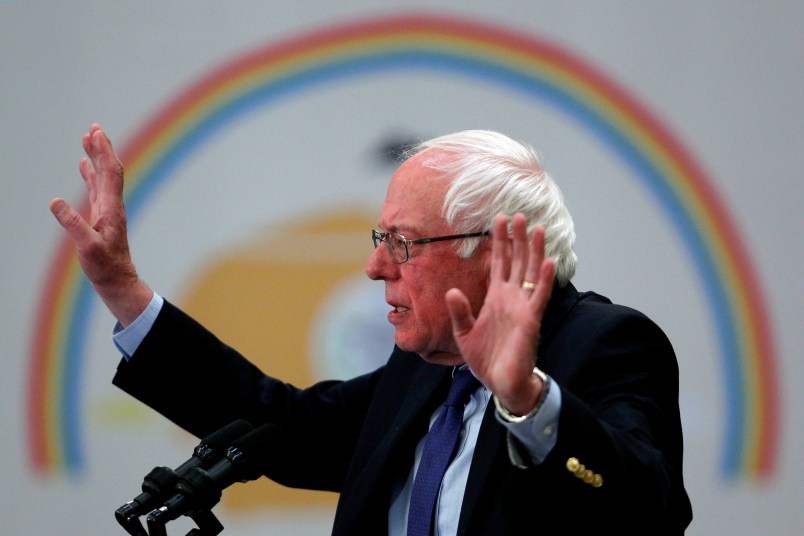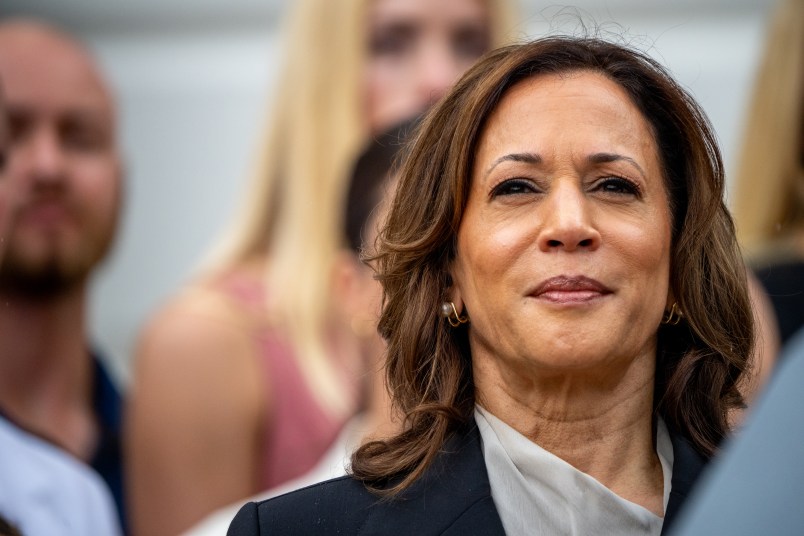Former TPMer Greg Sargent has an interesting post today about how the Sanders campaign could end and end well – specifically, by using his clout at the convention to reform the primary process. It’s an intriguing suggestion and makes a lot of sense since the Democrats’ system could use reforming even if it’s not quite as messed up as the Republicans’ one. But the problem is that the things most in need of reforming are the only things keeping Sanders in the race. That may sound like a provocation. But it’s actually true!
Let me explain.
The top problems with the process are basically three – not necessarily in this order.
1. Caucuses themselves. Caucuses always have extremely low turnout relative to primaries because they make it much more difficult to participate. In real elections we have a phrase for this: voter suppression. Caucuses are really the most effective voter suppression tool in politics today. That usually gets interpreted down to ‘they give a big advantage to the more organized campaign with more committed supporters.’ That’s true. But again, that’s the flip side of saying it’s a process that is too time-consuming and byzantine for the vast majority of people to participate. Caucuses are a cool civic exercise, a sort of Schoolhouse Rock performance art. But they shouldn’t substitute for real elections. All states should have primaries; caucuses should be abolished.
2. Super Delegates. The origins of super delegates are complicated. Depending on your interpretation of the history they are either there to stymie insurgent and/or unelectable candidates or prevent a factional candidate with a bare plurality (either of votes or delegates) from winning the nomination. Regardless, as I’ve noted in other contexts in recent weeks, we’ve now gone almost half a century enshrining a system based on the premise that each parties’ nominee is chosen through a series of state by state elections. The fact that it’s a party, not the government and the party can make the rules it wants is besides the point. The system is now based on the well-grounded public belief that it is a fair election process. You vote and your vote counts. In that context, almost a thousand delegates who are delegates automatically is simply impossible to justify. Indeed, everyone has seemed to realize over recent cycles that the whole super delegate artifact is a time bomb waiting to go off and in fact could never be used to overrule the candidate who clearly got the most votes or most delegates. Indeed, they’ve never gone against the winner of the public process: they virtually all got behind Barack Obama as it became clear that he was the winner of the public process and indeed almost certainly the stronger general election candidate.
Personally, I think it’s possible you could have a more palatable version of super delegates if they were restricted only to members of Congress and governors. (Currently various party officials are included too.) These aren’t ‘party insiders’. They’re all by definition people who are elected in public elections and pretty much by definition by Democrats. Whether that makes any sense I’ll leave to others. The current system needs reform and probably abolition.
3. Dark Delegates. This is the potential disjuncture between the delegates a candidate wins in the public process and how many and what delegates they get at the convention itself. We’ve seen this play out in both parties this year. In many cases, the primary or caucus doesn’t actually elect delegates. It elects delegates to a subsequent state convention. The outcome of that state convention can diverge substantially from the public election result on election night. Sometimes that’s because party regulars have different ideas about where the delegates should go. Other times it’s because more of one candidate’s state delegates show up than the other. In this latter case, the process recapitulates the problem with caucuses. It’s true that if delegates to a state convention don’t show up they have only themselves to blame if their candidate doesn’t get all their delegates. But that’s cold comfort if you’re a voter or caucus-goer who voted and then had someone else blow it and throw away your vote.
The darkest version of dark delegates is the gambit Ted Cruz seems to be pursuing now, which is fill slots of ‘Trump delegates’ with people who actually support Ted Cruz or are at least anti-Trump. This likely wouldn’t have any effect on the first ballot. But after the first ballot (or with some states, 2nd or 3rd ballot) they can show their true colors and vote Cruz. Again, the process (and this may be more the case on the GOP side) is out of line with the valid public perception of how the process is supposed to work.
Greg mentions a few other areas for reform: more transparency in debate scheduling, no big clusters of primaries on the same day and an end to ‘closed’ primaries. It is not clear to me that any of these are really reforms, in the sense of changes that correct actual problems. I don’t think the parties should be involved in setting up debates at all. Both parties got into that game this year because they thought there were too many debates last cycle. They wanted more control over the process and specifically to take it away from the media. Bad idea. The ‘reform’ in that case should be parties not being involved at all. On lots of primaries on a single day, maybe. But there’s only so much time. In the last case, it seems to me there are good arguments for open and closed primaries. Making all primaries open to independents and not just registered Democrats doesn’t strike me as an unqualified good.
In any case, that leaves us with the big three reforms. But here’s the problem: the biggest beneficiary of all three of these ‘problems’ is actually Bernie Sanders. Sanders’ wins have been concentrated overwhelmingly in caucus states. Sanders has also done a better job in the dark delegate hunt. He seems to have picked up or is in the process of picking up more delegates in Nevada, even though he ‘lost’. And he seems to be in the process of doing the same thing in Missouri.
But what about super delegates? It’s with super delegates at least that Clinton is gaining an unfair advantage, right?
Well, not exactly. Clinton still does have overwhelming support among super delegates. But they don’t even count as long as she secures a majority of pledged delegates. And she has a clear lead with pledged delegates. So even though super delegates support Clinton, her current lead does not depend on them at all.
But here’s the thing: People may disagree about whether Sanders still has a realistic chance of defeating Hillary Clinton. What he almost certainly doesn’t have a chance of doing is winning a majority of pledged delegates. The current plan, explicitly stated repeatedly by Sanders campaign manager Jeff Weaver, is to either to prevent Clinton from winning a majority of pledged delegates or actually win a plurality of pledged delegates and then make the case to super delegates that Sanders should be the nominee. The argument isn’t crazy: it would simply be that he’s a stronger candidate and that he had more momentum, was getting stronger as the primary process went on. (Indeed, that would definitely be true if Sanders were able to catch up in this way, in the way I just described.)
In any case, the relevant point is that Sanders current strategy explicit rests on winning the nomination by convincing the majority of super delegates to back him.
Now, none of this is wrong. Sanders is simply playing by the rules as they exist, as he should. Barack Obama got a critical boost from caucuses in 2008 too. You can’t change the rules mid-way through. Everyone knew what the rules were going in and had the ability to craft a strategy to play to them. But the simple fact is this: there are a number of reforms that would help make the nomination process more fair, democratic and transparent on the Democratic side. They all fix parts of the process that are currently helping Bernie Sanders.








